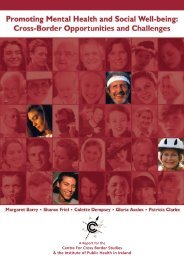improving government service delivery to minority ethnic ... - NCCRI
improving government service delivery to minority ethnic ... - NCCRI
improving government service delivery to minority ethnic ... - NCCRI
Create successful ePaper yourself
Turn your PDF publications into a flip-book with our unique Google optimized e-Paper software.
In hospitals the provision of interpretation facilities is left <strong>to</strong> the discretion of management by the Department<br />
of Health. In practice the hospital will contact a translation/interpretation agency who will then supply face <strong>to</strong><br />
face or telephone communication. On some occasions interpreters may have little training or experience in such<br />
work, which can sometimes take place in extremely sensitive or traumatic situations.<br />
At the conference in March 2006, the following statement was made about the health <strong>service</strong> in Ireland:<br />
“ Ordinary immigrants are used as interpreters by the health <strong>service</strong> because of the<br />
language difficulty, and this is in breach of the confidentiality clause because these<br />
people being used as interpreters have no training whatsoever when it comes <strong>to</strong><br />
medical practices.” 218<br />
218_Benedicta At<strong>to</strong>h,<br />
providing a <strong>minority</strong><br />
<strong>ethnic</strong> perspective at<br />
the conference, African<br />
Experience, member<br />
of the Louth African<br />
Women’s Group, Dundalk<br />
branch co‐ordina<strong>to</strong>r of<br />
the Integration of African<br />
children in Ireland (IACI).<br />
Some GPs have substantial numbers of migrants on their books while others do not, something which can lead<br />
<strong>to</strong> further difficulties for migrants who cannot find a GP as the latter is also the first port of call in Ireland, prior<br />
<strong>to</strong> a referral elsewhere in the medical system. Some immigrants who are entitled <strong>to</strong> medical cards do not have<br />
them because they may not know of their entitlements or because of bureaucratic delays. On the other hand<br />
some migrants assume they have a right of access <strong>to</strong> <strong>service</strong>s <strong>to</strong> which they are not entitled under the Irish<br />
system, which can also lead <strong>to</strong> misunderstandings.<br />
Case example 19 – Health<br />
Eastern Regional Health Authority’s Strategy for Ethnic Minorities<br />
The development of the then Eastern Regional Health Authority’s Regional Health Strategy for Ethnic Minorities<br />
reflected a growing awareness of the unique health and support needs of persons from <strong>minority</strong> <strong>ethnic</strong><br />
groups. It is probable that this was first developed in the East because of the greater numbers of <strong>service</strong> users<br />
requiring a range of health <strong>service</strong>s; although this does not negate the range of initiatives taking place in the<br />
rest of the country which addressed specific needs of asylum seekers and refugees in particular. The Strategy<br />
proposes a series of recommendations <strong>to</strong>gether with the establishment of a representative forum <strong>to</strong> oversee<br />
implementation of these recommendations. The <strong>to</strong>pics addressed include the provision of interpretation<br />
<strong>service</strong>s as well as ways and means of addressing the learning, training and development needs of staff<br />
in the health sec<strong>to</strong>r working with persons from <strong>minority</strong> <strong>ethnic</strong> groups. The HSE and <strong>NCCRI</strong> have already<br />
collaborated in the production of a document on this issue.<br />
Support <strong>to</strong> NGO sec<strong>to</strong>r for <strong>service</strong> provision<br />
While certain targeted <strong>service</strong>s are provided directly by the HSE <strong>to</strong> <strong>service</strong> users from <strong>minority</strong> <strong>ethnic</strong> groups<br />
(for example voluntary health screening for asylum seekers and refugees, a maternity outreach <strong>service</strong>s for<br />
asylum seekers in a Reception Centre, and interpretation <strong>service</strong>s), funding is also provided by the HSE <strong>to</strong><br />
a range of NGOs <strong>to</strong> provide additional identified <strong>service</strong>s in acknowledgement of the fact that NGOs may<br />
be better positioned in certain instances <strong>to</strong> deliver <strong>service</strong>s. Agencies such as CAIRDE, Spirasi and Access<br />
Ireland are examples of NGOs supported by the HSE in this way. A typical HSE-funded project, undertaken<br />
by CAIRDE, incorporates community development principles in addressing the health and support needs of<br />
persons from <strong>minority</strong> <strong>ethnic</strong> communities with HIV/AIDS. The HSE has already developed a similar cooperative<br />
model through the Traveller Health Unit, where a partnership operates between the HSE and Traveller<br />
representatives.
















